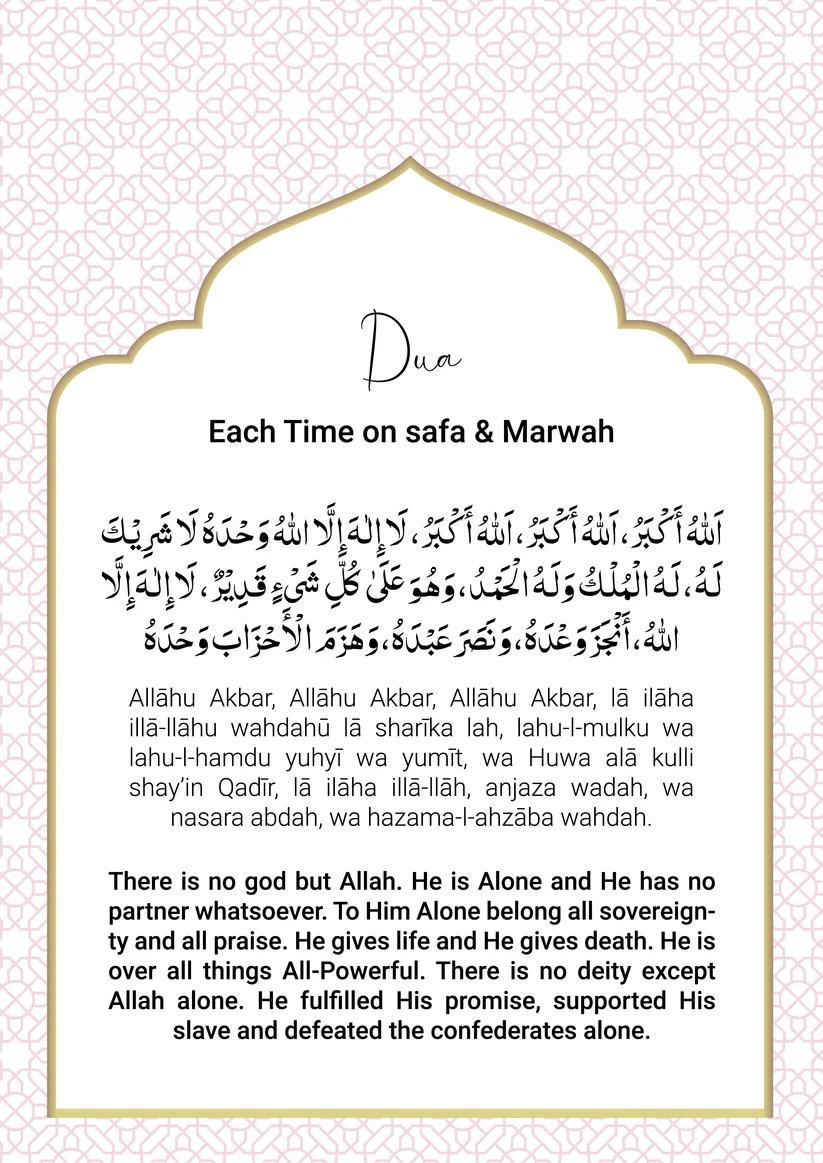
Performing Umrah is a deeply spiritual journey for Muslims, offering an opportunity to seek Allah’s blessings, forgiveness, and guidance. While not obligatory like Hajj, Umrah holds significant merit and provides a unique experience of spiritual renewal. One essential aspect of Umrah is the recitation of specific Duas (supplications) at various stages of the pilgrimage. This guide will help you understand and recite the necessary Duas for Umrah with ease and clarity.
Introduction to Umrah
Umrah, also known as the ‘lesser pilgrimage,’ can be performed at any time of the year and consists of four main rituals: Ihram, Tawaf, Sa’i, and Halq or Taqsir. Each of these rituals involves specific actions and supplications that draw the pilgrim closer to Allah. Understanding and properly reciting the Duas during Umrah is crucial for fulfilling the spiritual objectives of this sacred journey.
Ihram: The Beginning of the Journey
Ihram is the state of purity and dedication that a pilgrim enters before starting Umrah. It involves wearing specific clothing and making an intention (Niyyah) to perform Umrah. The first step is to make the Niyyah for Umrah, expressing your intention to undertake this spiritual journey. Following the Niyyah, you recite the Talbiyah, a declaration of your presence and commitment to Allah, which should be recited frequently throughout your journey.
Tawaf: Circumambulating the Kaaba
Tawaf involves circling the Kaaba seven times in a counter-clockwise direction. Each round begins at the Black Stone (Hajar al-Aswad). Before starting Tawaf, it is essential to recite a supplication acknowledging the greatness of Allah and affirming your faith. During each round of Tawaf, you can recite various supplications and prayers, seeking Allah’s blessings and mercy. Upon completing Tawaf, a specific supplication is recited to ask for an accepted pilgrimage and forgiven sins.
Sa’i: Walking Between Safa and Marwah
Sa’i commemorates Hagar’s search for water for her son Ishmael and involves walking seven times between the hills of Safa and Marwah. Before starting Sa’i, it is customary to recite a supplication at Safa, acknowledging it as one of the symbols of Allah. This supplication is followed by additional prayers as you proceed between Safa and Marwah. Similar supplications are made at Marwah, asking Allah for guidance, pleasure, and forgiveness.
Halq or Taqsir: Shaving or Trimming Hair
The final rite of Umrah is Halq (shaving the head) or Taqsir (trimming the hair). This act symbolizes the completion of the pilgrimage and the shedding of worldly concerns. After performing Halq or Taqsir, you recite a supplication seeking Allah’s acceptance of your Umrah and His blessings.
Conclusion
Performing Umrah is a profound spiritual experience, filled with moments of reflection, prayer, and connection with Allah. The Dua for Umrah guides the pilgrim through each step, ensuring that the journey is not just physical but deeply spiritual. By understanding and reciting these supplications, pilgrims can fully embrace the essence of Umrah and return with their hearts renewed and their souls cleansed.
Full Dua for Umrah
Niyyah for Umrah:
“لَبَّيْكَ اللّهُمَّ عُمْرَةً” (Labbaik Allahumma Umrah)
Translation: “Here I am, O Allah, performing Umrah.”
Talbiyah:
“لَبَّيْكَ اللّهُمَّ لَبَّيْكَ، لَبَّيْكَ لَا شَرِيْكَ لَكَ لَبَّيْكَ، إِنَّ الْحَمْدَ وَالنِّعْمَةَ لَكَ وَالْمُلْكَ، لَا شَرِيْكَ لَكَ”
(Labbaik Allahumma Labbaik, Labbaik La Sharika Laka Labbaik, Inna Al-Hamda Wa An-Ni’mata Laka Wa Al-Mulk, La Sharika Lak)
Translation: “Here I am, O Allah, here I am. Here I am, You have no partner, here I am. Verily all praise, grace, and sovereignty belong to You. You have no partner.”
Dua for Starting Tawaf:
“بِسْمِ اللّهِ وَاللّهُ أَكْبَرُ، اللّهُمَّ إِيمَانًا بِكَ وَتَصْدِيقًا بِكِتَابِكَ وَوَفَاءً بِعَهْدِكَ وَاتِّبَاعًا لِسُنَّةِ نَبِيِّكَ مُحَمَّدٍ صَلَّى اللّهُ عَلَيْهِ وَسَلَّمَ”
(Bismillah Allahu Akbar, Allahumma Imanan Bika Wa Tasdeeqan Bikitabika Wa Wafaa’an Biahadika Wa Ittiba’an Li Sunnati Nabiyyika Muhammad Sallallahu Alaihi Wasallam)
Translation: “In the name of Allah, Allah is the Greatest. O Allah, with faith in You, belief in Your Book, fulfilling Your covenant, and following the Sunnah of Your Prophet Muhammad, peace be upon him.”
Dua During Tawaf:
During each round, recite any supplications or prayers. A recommended supplication is:
“رَبَّنَا آتِنَا فِي الدُّنْيَا حَسَنَةً وَفِي الْآخِرَةِ حَسَنَةً وَقِنَا عَذَابَ النَّارِ”
(Rabbana Atina Fid Dunya Hasanatan Wa Fil Akhirati Hasanatan Wa Qina Adhaban-Nar)
Translation: “Our Lord, give us good in this world and good in the Hereafter, and protect us from the punishment of the Fire.”
Dua for Completing Tawaf:
“اللّهُمَّ اجْعَلْهُ حَجًّا مَبْرُورًا وَذَنْبًا مَغْفُورًا وَسَعْيًا مَشْكُورًا”
(Allahumma Ijalhu Hajjan Mabrooran Wa Dhanban Maghfooran Wa Sa’yan Mashkooran)
Translation: “O Allah, make it an accepted pilgrimage, forgiven sins, and a praiseworthy effort.”
Dua at Safa:
“إِنَّ الصَّفَا وَالْمَرْوَةَ مِنْ شَعَائِرِ اللَّهِ”
(Innas Safa Wal Marwata Min Sha’a’irillah)
Translation: “Indeed, Safa and Marwah are among the symbols of Allah.”
“نَبْدَأُ بِمَا بَدَأَ اللَّهُ بِهِ”
(Nabda’u Bima Bada’allahu Bih)
Translation: “We start with what Allah started with.”
Dua at Marwah:
Similar supplications can be made at Marwah. You may recite:
“اللّهُمَّ اجْعَلْنِي فِيهِمَا مِنَ الْمُقْتَدِينَ بِهِدَايَتِكَ، وَاجْعَلْنِي فِيهِمَا مِنَ السَّاعِينَ إِلَى مَرْضَاتِكَ، وَاجْعَلْنِي فِيهِمَا مِنَ الْمُسْتَغْفِرِينَ بِرَحْمَتِكَ”
(Allahumma Ijalni Fihima Minal Muqtadineen Bihdayatika, Wa Ijalni Fihima Minas-Sa’een Ila Mardatik, Wa Ijalni Fihima Minal Mustaghfireen Birahmatika)
Translation: “O Allah, make me in them among those who follow Your guidance, make me in them among those who seek Your pleasure, and make me in them among those who seek Your forgiveness through Your mercy.”
Dua for Halq/Taqsir:
“اللّهُمَّ تَقَبَّلْ مِنَّا إِنَّكَ أَنتَ السَّمِيعُ الْعَلِيمُ”
(Allahumma Taqabbal Minna Innaka Antas-Sami’ul-Aleem)
Translation: “O Allah, accept it from us; indeed, You are the All-Hearing, the All-Knowing.”
Completing this step signifies the end of Umrah, and you exit the state of Ihram, resuming normal activities.
May Allah accept your Umrah and grant you His infinite blessings.

























Oh my goodness! Amazing article dude! Many thanks,
However I am going through troubles with your RSS. I don’t understand why I cannot subscribe to it.
Is there anybody getting identical RSS problems? Anybody who knows the solution will you kindly respond?
Thanx!!
Pretty section of content. I just stumbled upon your weblog and in accession capital to assert that
I acquire in fact enjoyed account your blog posts.
Anyway I will be subscribing to your feeds and even I achievement you access consistently quickly.